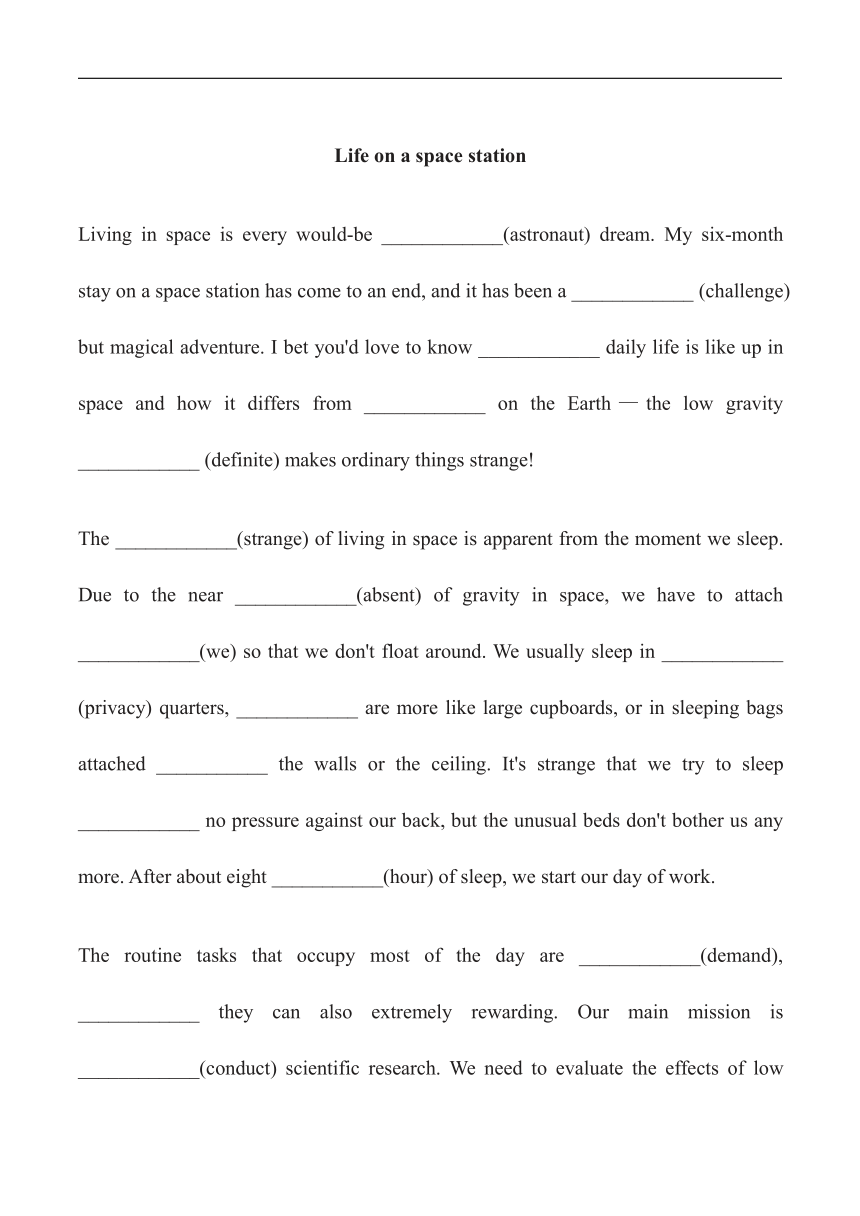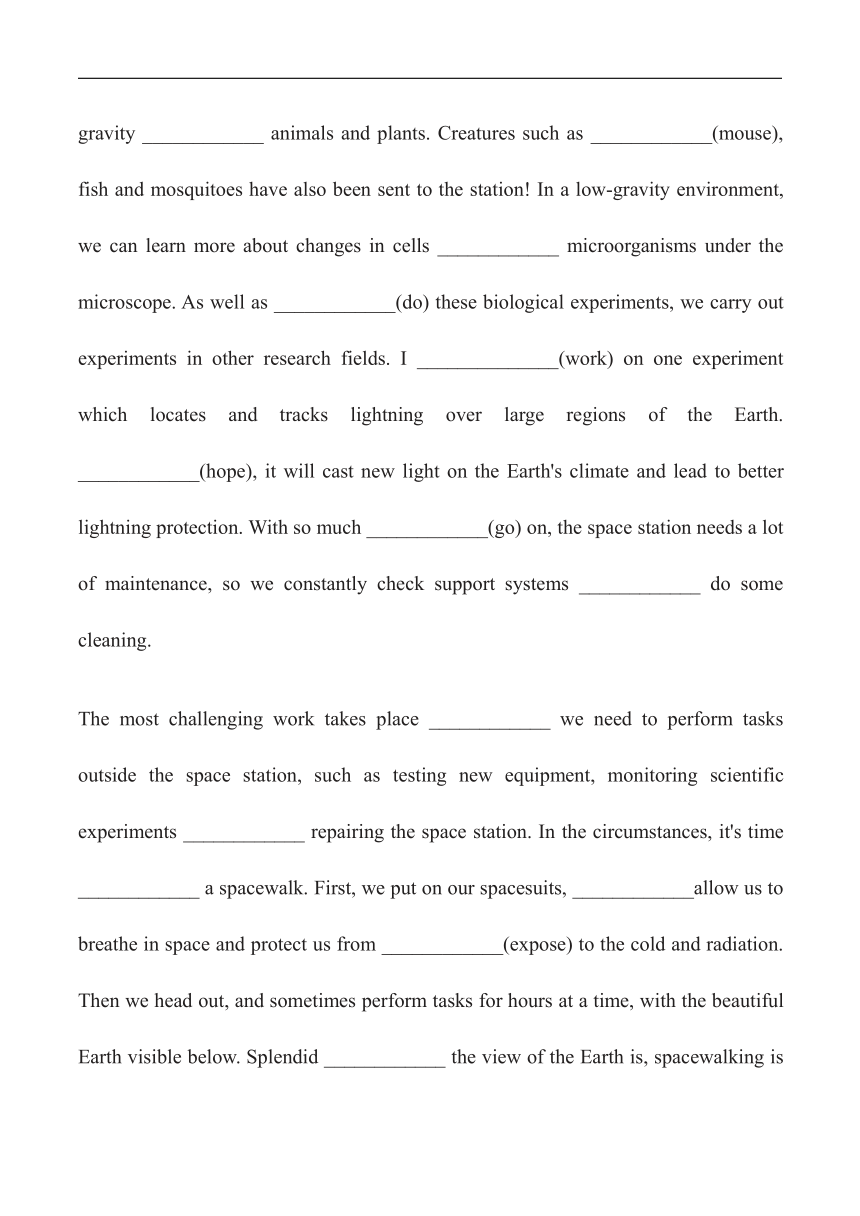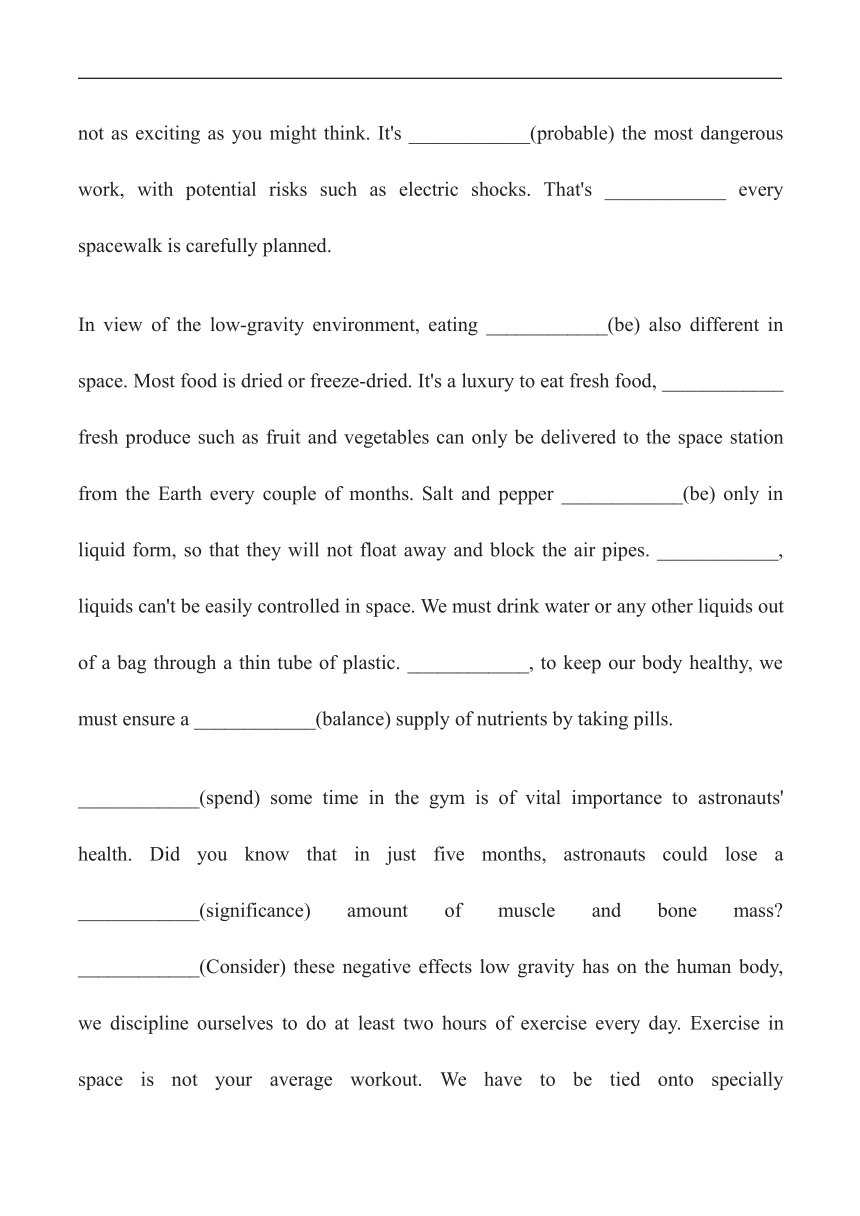牛津译林版(2019)选择性必修 第三册Unit 2 Out of this world Reading 课文语法填空(无答案)
文档属性
| 名称 | 牛津译林版(2019)选择性必修 第三册Unit 2 Out of this world Reading 课文语法填空(无答案) |  | |
| 格式 | docx | ||
| 文件大小 | 19.6KB | ||
| 资源类型 | 教案 | ||
| 版本资源 | 牛津译林版(2019) | ||
| 科目 | 英语 | ||
| 更新时间 | 2024-03-15 12:50:51 | ||
图片预览



文档简介
Life on a space station
Living in space is every would-be ____________(astronaut) dream. My six-month stay on a space station has come to an end, and it has been a ____________ (challenge) but magical adventure. I bet you'd love to know ____________ daily life is like up in space and how it differs from ____________ on the Earth—the low gravity ____________ (definite) makes ordinary things strange!
The ____________(strange) of living in space is apparent from the moment we sleep. Due to the near ____________(absent) of gravity in space, we have to attach ____________(we) so that we don't float around. We usually sleep in ____________ (privacy) quarters, ____________ are more like large cupboards, or in sleeping bags attached ___________ the walls or the ceiling. It's strange that we try to sleep ____________ no pressure against our back, but the unusual beds don't bother us any more. After about eight ___________(hour) of sleep, we start our day of work.
The routine tasks that occupy most of the day are ____________(demand), ____________ they can also extremely rewarding. Our main mission is ____________(conduct) scientific research. We need to evaluate the effects of low gravity ____________ animals and plants. Creatures such as ____________(mouse), fish and mosquitoes have also been sent to the station! In a low-gravity environment, we can learn more about changes in cells ____________ microorganisms under the microscope. As well as ____________(do) these biological experiments, we carry out experiments in other research fields. I ______________(work) on one experiment which locates and tracks lightning over large regions of the Earth. ____________(hope), it will cast new light on the Earth's climate and lead to better lightning protection. With so much ____________(go) on, the space station needs a lot of maintenance, so we constantly check support systems ____________ do some cleaning.
The most challenging work takes place ____________ we need to perform tasks outside the space station, such as testing new equipment, monitoring scientific experiments ____________ repairing the space station. In the circumstances, it's time ____________ a spacewalk. First, we put on our spacesuits, ____________allow us to breathe in space and protect us from ____________(expose) to the cold and radiation. Then we head out, and sometimes perform tasks for hours at a time, with the beautiful Earth visible below. Splendid ____________ the view of the Earth is, spacewalking is not as exciting as you might think. It's ____________(probable) the most dangerous work, with potential risks such as electric shocks. That's ____________ every spacewalk is carefully planned.
In view of the low-gravity environment, eating ____________(be) also different in space. Most food is dried or freeze-dried. It's a luxury to eat fresh food, ____________ fresh produce such as fruit and vegetables can only be delivered to the space station from the Earth every couple of months. Salt and pepper ____________(be) only in liquid form, so that they will not float away and block the air pipes. ____________, liquids can't be easily controlled in space. We must drink water or any other liquids out of a bag through a thin tube of plastic. ____________, to keep our body healthy, we must ensure a ____________(balance) supply of nutrients by taking pills.
____________(spend) some time in the gym is of vital importance to astronauts' health. Did you know that in just five months, astronauts could lose a ____________(significance) amount of muscle and bone mass ____________(Consider) these negative effects low gravity has on the human body, we discipline ourselves to do at least two hours of exercise every day. Exercise in space is not your average workout. We have to be tied onto specially ____________(design) exercise equipment to stop ourselves ____________floating around.
During our leisure time, there's nothing we like ____________(much) than to sit back with the rest of the crew and watch our remarkable planet go by, ____________(take) pictures for our family and friends back home. As the space station travels ____________ a speed of about 17,500 miles per hour, we get to see the sunrise every 90 minutes. In these precious ____________(moment), all the challenges of life in space seem worth it.
Para1: astronaut's, challenging, what, that, definitely
Para2: strangeness, absence, ourselves,private, which,to, with,hours
Para3:demanding, but, to conduct, on, mice, and, doing, have been working, Hopefully, going, and
Para4:when, or, for, which, exposure/being exposed, as, probably, why
Para5:is, because, are, However, Furthermore, balanced
Para6:Spending, significant, Considering, designed, from
Para7:more, taking, at, moments
课文翻译: 空间站的生活
在太空生活是每个想成为宇航员的人的梦想。我在空间站的六个月已经结束了,这是一次充满挑战但奇妙的冒险。我敢保证你很想知道太空中的日常生活是什么样子,以及它与地球上的生活有什么不同——低重力肯定会使平常的事情变得不同寻常!
从睡觉的那刻起,我们就能明显感受到在太空生活的奇妙。由于太空中近乎没有重力,我们必须把自己固定住,才不会四处飘浮。我们通常睡在独立的睡眠区,更像是大的橱柜,或者睡在固定在墙上或者天花板上的睡袋里。尝试背部没有压力入睡是奇怪的,但我们不再为这些特别的床而烦恼了。在约八小时的睡眠后,我们开始了一天的工作。
日常工作占用了一天里大部分时间,要求很高,但它们也会非常有意义。我们的主要任务是进行科学研究。我们需要评估低重力对动植物的影响。诸如老鼠、鱼、蚊子等生物也被送到了空间站!在低重力环境下,我们可以通过显微镜更多地了解细胞和微生物的变化。除了做这些生物实验,我们还开展其他研究领域的实验。我一直在做一个实验,可以定位并追踪地球上大片区域的闪电。希望这个实验能使人们进一步了解地球气候,并更好地做好雷电防护。空间站里发生那么多事情,需要大量的维护,所以我们经常检查空间站的支撑系统,并做一些清洁工作。
当我们需要在空间站外面执行任务时,例如测试新设备、监测科学实验或修理空间站,就会产生最具挑战性的工作。在这种情况下,是时候来场太空行走了。首先,我们穿上太空服,它们可以让我们在太空中呼吸,保护我们免受寒冷和辐射的伤害。然后我们走出空间站,有时执行任务要连续好几个小时,向下可以看到美丽的地球。尽管地球上的景色美妙绝伦,但太空行走并不像你们可能想象的那么激动人心。这可能是最危险的工作,因为有电击之类的潜在风险。这就是为什么(我们)要仔细规划好每次的太空行走。
考虑到低重力环境,太空中的饮食也大不相同。大多数食物都是脱水或冻干的。吃到新鲜的食物是一种奢侈,因为水果和蔬菜等新鲜农产品只能每隔几个月从地球运到空间站。盐和胡椒粉仅以液体的形式存在,这样它们就不会飘来飘去,堵塞通气管。但是,液体在太空中不容易控制。我们必须用塑料细管,从袋子里面喝水或其他液体。此外,为了保持身体健康,我们必须吃药来保证营养的均衡补给。
花些时间在健身房锻炼对宇航员的健康是至关重要的。你知道仅仅在五个月里宇航员就可能失去相当多的肌肉量和骨量吗 鉴于低重力对人体的这些负面影响,我们严格要求自己每天至少运动两个小时。在太空中锻炼可不是普通的锻炼。我们必须绑在专门设计的运动器材上,防止我们到处飘浮。
在闲暇时间,我们最喜欢做的事就是和其他工作人员一起舒服地坐下来,看着我们非凡的地球经过,拍下照片给地球上的家人和朋友看。空间站以每小时约17500英里的速度飞行,所以我们每隔90分钟就能看到日出。在这些珍贵的时刻,太空生活的所有挑战似乎都是值得的。
Living in space is every would-be ____________(astronaut) dream. My six-month stay on a space station has come to an end, and it has been a ____________ (challenge) but magical adventure. I bet you'd love to know ____________ daily life is like up in space and how it differs from ____________ on the Earth—the low gravity ____________ (definite) makes ordinary things strange!
The ____________(strange) of living in space is apparent from the moment we sleep. Due to the near ____________(absent) of gravity in space, we have to attach ____________(we) so that we don't float around. We usually sleep in ____________ (privacy) quarters, ____________ are more like large cupboards, or in sleeping bags attached ___________ the walls or the ceiling. It's strange that we try to sleep ____________ no pressure against our back, but the unusual beds don't bother us any more. After about eight ___________(hour) of sleep, we start our day of work.
The routine tasks that occupy most of the day are ____________(demand), ____________ they can also extremely rewarding. Our main mission is ____________(conduct) scientific research. We need to evaluate the effects of low gravity ____________ animals and plants. Creatures such as ____________(mouse), fish and mosquitoes have also been sent to the station! In a low-gravity environment, we can learn more about changes in cells ____________ microorganisms under the microscope. As well as ____________(do) these biological experiments, we carry out experiments in other research fields. I ______________(work) on one experiment which locates and tracks lightning over large regions of the Earth. ____________(hope), it will cast new light on the Earth's climate and lead to better lightning protection. With so much ____________(go) on, the space station needs a lot of maintenance, so we constantly check support systems ____________ do some cleaning.
The most challenging work takes place ____________ we need to perform tasks outside the space station, such as testing new equipment, monitoring scientific experiments ____________ repairing the space station. In the circumstances, it's time ____________ a spacewalk. First, we put on our spacesuits, ____________allow us to breathe in space and protect us from ____________(expose) to the cold and radiation. Then we head out, and sometimes perform tasks for hours at a time, with the beautiful Earth visible below. Splendid ____________ the view of the Earth is, spacewalking is not as exciting as you might think. It's ____________(probable) the most dangerous work, with potential risks such as electric shocks. That's ____________ every spacewalk is carefully planned.
In view of the low-gravity environment, eating ____________(be) also different in space. Most food is dried or freeze-dried. It's a luxury to eat fresh food, ____________ fresh produce such as fruit and vegetables can only be delivered to the space station from the Earth every couple of months. Salt and pepper ____________(be) only in liquid form, so that they will not float away and block the air pipes. ____________, liquids can't be easily controlled in space. We must drink water or any other liquids out of a bag through a thin tube of plastic. ____________, to keep our body healthy, we must ensure a ____________(balance) supply of nutrients by taking pills.
____________(spend) some time in the gym is of vital importance to astronauts' health. Did you know that in just five months, astronauts could lose a ____________(significance) amount of muscle and bone mass ____________(Consider) these negative effects low gravity has on the human body, we discipline ourselves to do at least two hours of exercise every day. Exercise in space is not your average workout. We have to be tied onto specially ____________(design) exercise equipment to stop ourselves ____________floating around.
During our leisure time, there's nothing we like ____________(much) than to sit back with the rest of the crew and watch our remarkable planet go by, ____________(take) pictures for our family and friends back home. As the space station travels ____________ a speed of about 17,500 miles per hour, we get to see the sunrise every 90 minutes. In these precious ____________(moment), all the challenges of life in space seem worth it.
Para1: astronaut's, challenging, what, that, definitely
Para2: strangeness, absence, ourselves,private, which,to, with,hours
Para3:demanding, but, to conduct, on, mice, and, doing, have been working, Hopefully, going, and
Para4:when, or, for, which, exposure/being exposed, as, probably, why
Para5:is, because, are, However, Furthermore, balanced
Para6:Spending, significant, Considering, designed, from
Para7:more, taking, at, moments
课文翻译: 空间站的生活
在太空生活是每个想成为宇航员的人的梦想。我在空间站的六个月已经结束了,这是一次充满挑战但奇妙的冒险。我敢保证你很想知道太空中的日常生活是什么样子,以及它与地球上的生活有什么不同——低重力肯定会使平常的事情变得不同寻常!
从睡觉的那刻起,我们就能明显感受到在太空生活的奇妙。由于太空中近乎没有重力,我们必须把自己固定住,才不会四处飘浮。我们通常睡在独立的睡眠区,更像是大的橱柜,或者睡在固定在墙上或者天花板上的睡袋里。尝试背部没有压力入睡是奇怪的,但我们不再为这些特别的床而烦恼了。在约八小时的睡眠后,我们开始了一天的工作。
日常工作占用了一天里大部分时间,要求很高,但它们也会非常有意义。我们的主要任务是进行科学研究。我们需要评估低重力对动植物的影响。诸如老鼠、鱼、蚊子等生物也被送到了空间站!在低重力环境下,我们可以通过显微镜更多地了解细胞和微生物的变化。除了做这些生物实验,我们还开展其他研究领域的实验。我一直在做一个实验,可以定位并追踪地球上大片区域的闪电。希望这个实验能使人们进一步了解地球气候,并更好地做好雷电防护。空间站里发生那么多事情,需要大量的维护,所以我们经常检查空间站的支撑系统,并做一些清洁工作。
当我们需要在空间站外面执行任务时,例如测试新设备、监测科学实验或修理空间站,就会产生最具挑战性的工作。在这种情况下,是时候来场太空行走了。首先,我们穿上太空服,它们可以让我们在太空中呼吸,保护我们免受寒冷和辐射的伤害。然后我们走出空间站,有时执行任务要连续好几个小时,向下可以看到美丽的地球。尽管地球上的景色美妙绝伦,但太空行走并不像你们可能想象的那么激动人心。这可能是最危险的工作,因为有电击之类的潜在风险。这就是为什么(我们)要仔细规划好每次的太空行走。
考虑到低重力环境,太空中的饮食也大不相同。大多数食物都是脱水或冻干的。吃到新鲜的食物是一种奢侈,因为水果和蔬菜等新鲜农产品只能每隔几个月从地球运到空间站。盐和胡椒粉仅以液体的形式存在,这样它们就不会飘来飘去,堵塞通气管。但是,液体在太空中不容易控制。我们必须用塑料细管,从袋子里面喝水或其他液体。此外,为了保持身体健康,我们必须吃药来保证营养的均衡补给。
花些时间在健身房锻炼对宇航员的健康是至关重要的。你知道仅仅在五个月里宇航员就可能失去相当多的肌肉量和骨量吗 鉴于低重力对人体的这些负面影响,我们严格要求自己每天至少运动两个小时。在太空中锻炼可不是普通的锻炼。我们必须绑在专门设计的运动器材上,防止我们到处飘浮。
在闲暇时间,我们最喜欢做的事就是和其他工作人员一起舒服地坐下来,看着我们非凡的地球经过,拍下照片给地球上的家人和朋友看。空间站以每小时约17500英里的速度飞行,所以我们每隔90分钟就能看到日出。在这些珍贵的时刻,太空生活的所有挑战似乎都是值得的。
同课章节目录
